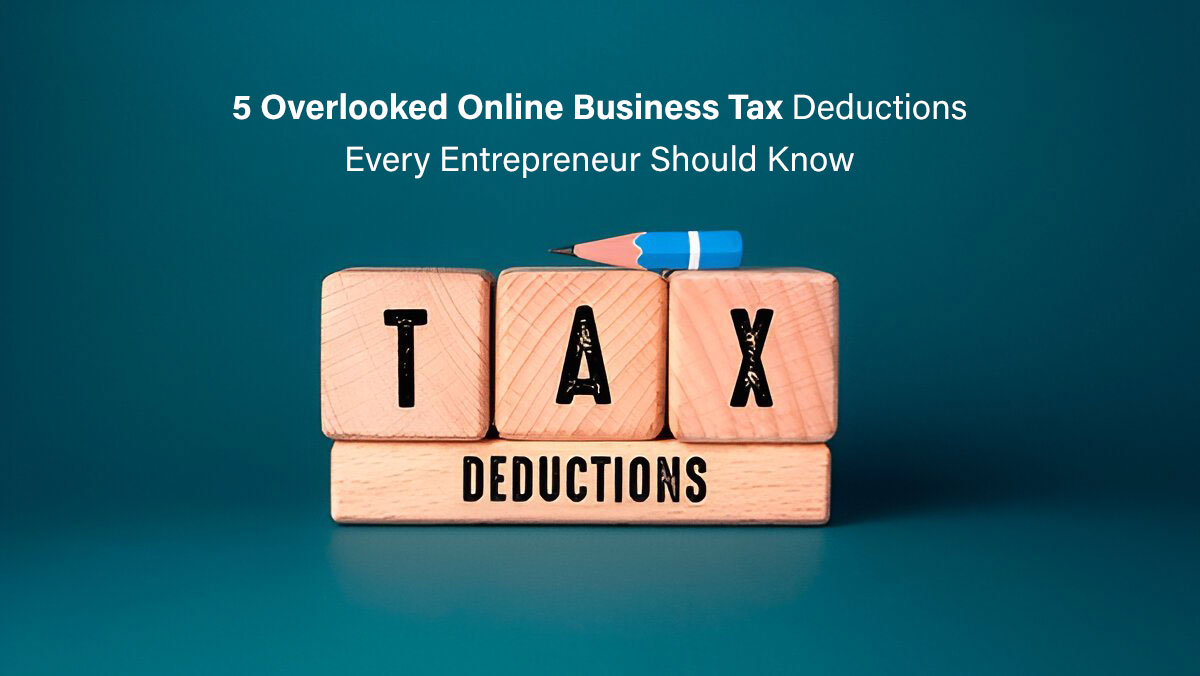If you run an online business, freelance full-time, or create digital content, you’re likely leaving money on the table at tax time.
Many digital entrepreneurs miss out on online business tax deductions simply because they don’t know what they qualify for. The truth is, the IRS offers dozens of legitimate ways to reduce your taxable income — especially if you’re self-employed.
This guide breaks down 5 overlooked business tax deductions you might be missing in 2025 — explained in plain English. Whether you’re a freelancer, coach, YouTuber, ecommerce owner, or influencer, these tips could help you save hundreds or even thousands on your next tax return.
- The Home Office Deduction (Yes, Even for Small Spaces)
If you work from home (even part-time), you may qualify for the home office deduction — one of the most commonly missed tax write-offs for solopreneurs.
What You Can Deduct:
- A percentage of your rent or mortgage
- Utilities like electricity and internet
- Repairs or maintenance to your workspace
Important:
According to home office deduction rules, your workspace must be:
- Regularly and exclusively used for business
- Your principal place of business
Example: If your office takes up 10% of your home, you may deduct 10% of rent, internet, and electric bills.
It doesn’t have to be a full room — even a dedicated corner of your living space may qualify. Just make sure it meets the IRS criteria.
- Equipment & Software (Your Laptop Can Be a Write-Off)
If you buy tools or tech that help run your business, they likely count as self-employed tax deductions. This includes:
- Laptops and monitors
- Cameras and lighting (for content creators)
- Subscription tools (Zoom, Canva, email marketing platforms)
- Website costs (hosting, domain, themes, plugins)
Whether you’re editing videos, managing a blog, or running a Shopify store, these expenses are considered essential to your operations — and totally deductible.
Pro tip: Keep digital receipts and note whether a purchase is used 100% or partially for business.
- Business Travel and Meals
If you attend conferences, meet with clients, or travel to film content, some of those expenses may be deductible.
Deductible Items:
- Flights, trains, taxis, rental cars
- Lodging during business trips
- 50% of business-related meals
- Event tickets (as long as they’re business-related)
To claim these online business tax deductions, your travel must have a clear business purpose, not just personal exploration.
If you’re a content creator attending VidCon or a freelancer flying to a client meeting — that counts!
- Professional Services & Outsourcing Costs
Many digital entrepreneurs use contractors or agencies to grow. If you’ve hired:
- A virtual assistant
- A bookkeeper
- A social media manager
- A copywriter or SEO expert
…then their fees are part of your tax write-offs for content creators and freelancers alike.
Don’t forget professional services like:
- Legal or accounting help
- Online course platforms
- Paid coaching or consulting (if used for business purposes)
These costs fall under self-employed tax deductions and can quickly add up.
- Education, Training & Subscriptions
Want to sharpen your skills or stay ahead in your industry? You can likely deduct:
- Online courses and certifications
- Paid memberships (LinkedIn Premium, industry groups)
- Books or audiobooks related to your field
- Business-related subscriptions (Notion, Trello, Google Workspace)
Many digital workers forget these because they seem “personal,” but if the intent is professional growth, they’re often deductible.
Bonus: How to Legally Reduce Taxable Income
Here are a few general tax tips for freelancers and self-employed business owners to legally reduce taxable income:
- Max out a retirement plan
- Use a SEP IRA, Solo 401(k), or traditional IRA to reduce current-year taxes while saving for the future.
- Track every dollar
- Use tools like QuickBooks or Wave to log expenses automatically. Keep digital receipts in Google Drive or Dropbox.
- Separate business and personal finances
- Use a dedicated business bank account and credit card to make tracking deductions easier (and IRS-proof).
- File quarterly estimated taxes
- Avoid penalties and stay on top of your financial health by paying taxes throughout the year.
Commonly Overlooked Business Tax Deductions
Even seasoned entrepreneurs miss these:
- Phone bill (if used for business calls, Zooms, etc.)
- Coworking space fees
- Bank or payment processing fees (PayPal, Stripe, etc.)
- Digital advertising spend (Facebook, Google, influencer sponsorships)
- Depreciation on long-term equipment
These aren’t loopholes — they’re legitimate IRS-approved deductions that help balance out your business income.
Who Should Pay Attention?
These tips are especially useful for:
- Freelancers and consultants
- Content creators (YouTubers, podcasters, bloggers)
- Coaches and online educators
- Etsy, Shopify, and Amazon sellers
- Digital service providers (graphic designers, copywriters, marketers)
Basically, if you earn 1099 income or run a small business from your laptop — you qualify for many of these online business tax deductions.
Final Thoughts: Keep More of What You Earn
Taxes don’t have to be overwhelming. Knowing what qualifies as a write-off can give you confidence — and more cash — come tax season. Even if you outsource your filing to a tax professional, understanding your deductions helps you stay in control.
Don’t wait until April. Start tracking now, and review your expenses monthly to stay ahead.
Need expert guidance? At KB Tax Devisers, we help online entrepreneurs and self-employed pros navigate these exact issues. Whether you want to optimize your deductions, estimate quarterly payments, or just get clarity, we’re here to help.
Ready to save on your 2025 taxes?
Schedule a consultation with KB Tax Devisers today and discover what deductions you’ve been missing.



